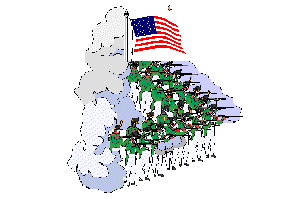
foreword | Historical Narratives | Resources | Links | Contact
RESOLVED BY THIS HOUSE
History is our storied past.
He saved the citizens of Upper Canada from one of humankind's gravest miseries: the calamity of war. The founding fathers at Newark who were forever grateful did not forget him.
It all began in 1783 with the Treaty of Paris which ended the American Revolution. One of its terms required that "seven unconquered, northwest posts all on American territory be vacated by the British with all convenient speed." Britain was slow in implementing this provision citing the United States' failure to honour all of its treaty terms, in particular, those dealing with the reimbursement of Loyalists for their losses. Until this lapse was rectified Britain were determined to retain possession of the posts at "Michilimackinac, Detroit, Sandusky, Presqu'le (now Erie), Niagara, Oswego and Oswegatchie (now Ogdensburg)."
Britain's cavalier non-compliance with the treaty terms aroused a great deal of American anger which reached fever pitch in 1794. In the spring of that year the British rubbed salt into the wound by flagrantly reconstructing on American territory Fort Miamis, a small fort which had been partially destroyed when it was abandoned by the British at the end of the revolutionary war.
When France declared war on Britain in February 1793 it was feared the Americans would use this opportunity to capture Canada and rid the continent once and for all of the British presence. Lord Dorchester believed the American military would "close us up at Detroit," and to protect his southern flank he ordered Lieutenant-governor Simcoe to enter American territory to re-occupy and restore the fort on the Maumee River. He directed that it be completed speedily and armed quickly with cannon "of larger calibre than what Mr. Wayne can bring against it." General Anthony Wayne's forces were menacing the area.
While Simcoe was as militant as most towards the republicans to the south he was shocked by the Dorchester's order. Its audacity took his breath away. This incursion onto American territory could very well lead to war. Simcoe was a soldier and would follow orders but he delayed his departure as long as he could doubtless hoping Dorchester might rethink and revoke the order. Simcoe blamed his delay on the intensely cold weather then gripping the country. He finally set out in mid-March travelling down Lake Ontario to Burlington Bay then crossing overland to the Mohawk Village on the Grand River which he reached on the 25th. From there he proceeded to Fort Detroit where he was joined by a company of His Majesty's Troops with whom he arrived at the fort on the Maumee River on April 7th.
Near the rapids in the river Simcoe
In His Own Words
"supervised the establishment of Fort Miamis on the principles of self-defence for the protection of His Majesty's Rights and of his Subjects in case the Army of the United States now under command of General Wayne, should as it menaces, invade the British possessions."
When an astonished Thomas Jefferson, the American secretary of state, learned of Simcoe's mission on the Maumee he dubbed it "Governor Simcoe's Invasion." Before returning to Newark in late April Simcoe oversaw the siting of one lone cannon behind the stockade of the uncompleted post.
Initially, Fort Miamis, which is located southwest of present-day Toledo, Ohio, was garrisoned by Major William Campbell and fifty men of the 24th Regiment of Foot from Detroit. This small force was subsequently reinforced by two more companies from Detroit along with eight men of the Royal Artillery under Lieutenant Givens. Two small howitzers mounted on 'grasshopper carriages' were sent from Detroit along with a fresh supply of ammunition and one hundred barrels of provisions. To ensure the fort was ready in the event of hostilities a hundred workers were dispatched from Detroit and they feverishly finished work on it in fifteen days.
Simcoe, who placed a good deal of confidence in Campbell's prudence and discretion, issued strict orders to allow no hostile act to be committed against the American army unless absolutely necessary. In August Campbell reported that all cannons had been mounted and that several more nine pounders were expected shortly from Turtle Island located at the entrance of Miami Bay. Within three days of their arrival Campbell reported that "despite a heavy sick list he expected to be in a state of defence as to bid defiance to General Wayne's whole army whose force of 4000 which was known to be advancing on the fort.
Native warriors were a constant source of anxiety for the Americans who blamed their increasing hostility on British agents. They were accused of inciting the Aboriginals to resist American expansion by furnishing the warriors with muskets and ammunition. Agents were also accused of fighting in disguise among the warriors. In fact, the Native people were simply attempting to defend their land from rapidly expanding American settlements whose growth knew no bounds. In early August Simcoe informed his superior, Henry Dundas, that he had heard from Aboriginal sources that Wayne's army had orders to reduce the British post at Miamis and the following spring he was planning to attack Detroit which Simcoe described as a nominal Fortress with a nominal Garrison." Simcoe feared caution would be overtaken by cannonade and spent the rest of August nervously sniffing the wind for a whiff of gunpowder that would warn of war with America.
On August 20th, 1794 Major-General Anthony Wayne defeated a Native force at the Battle of Fallen Timbers. Although the conflict occurred near Fort Miamis no British troops were involved because they had been ordered to remain neutral. Flushed with victory and spoiling for a fight the American troops positioned themselves on the heights overlooking Fort Miamis almost within reach of its guns. An itchy finger on either side would have meant war between Britain and the United States.
The encounter when it came was a war of words carried on in caustic but unfailingly courteous correspondence. The military missives were initiated by Campbell who demanded to know why Wayne had positioned his troops so close to the Colours of his Majesty's post. He stated, "I know of no war existing between Great Britain and America." Wayne responded disdainfully but "without breach of decorum" that the "muzzles of his guns had spoken eloquently to the Aboriginal braves the day before and could do so again." He added that the cannons of the British fort "built on American territory" would prove no impediment to the further progress of his victorious army of 4000 men.
 |
The British garrison numbered but a few hundred men but the irrepressible Campbell shot back that his forbearance of the "insults offered to the British flag" was wearing thin. While he was anxious "to prevent that dreadful decision," his honour and duty to King and country would soon demand he take measures which,
In His Own Words
"thousands from both countries would have cause to regret."
Wayne moderated his rhetoric and disclaimed any intent to fire first but denounced the construction of the fort as naked aggression and called on Campbell to retire immediately with his troops from American territory, where they were committing an act of "the highest hostility and aggression." Campbell courtly dismissed this demand and declared, "I will certainly not abandon this post."
Within sight of the fort Wayne responded by torching barns, farms, and fields including "hay which his cavalry could not but want," as well as destroying the corn crop on which the Indians depended for winter sustenance. Wayne then "reconnoitered the fort in an insolent way."
 |
Campbell vowed he would not do so again with impunity. When Wayne realized that Campbell and his men were not going to be intimidated by the menaces of thousands of troops, he rode in a rage to the gates of Fort Miamis where he berated the British soldiers on duty in "gross and illiberal language." This proved to be a vain attempt to provoke the redcoats into replying with words or worse so that Wayne might have an excuse to storm the fort. Campbell had ordered his men to maintain prudence in the face of any insult and Wayne's words fell on deaf ears. President Washington's strict orders to avoid a confrontation with the British military restrained Wayne's patriotic passions.
 |
As the new day dawned the Americans attempted once more to intimidate the small British garrison by approaching the fort in a menacing manner. Major Campbell acted to implement his threat. He directed that a cannon be pointed at the assembled soldiers and that a match be lit. War awaited Wayne's reaction. Cool heads prevailed on both sides of the barricade and the Americans withdraw. Having flaunted his flag in the face of the British garrison Wayne retired to his post. He congratulated his army on their brilliant success against the Natives which "the British post had neither the power nor the inclination" to prevent." His Majesty's military were, he said, "tacit spectators whose flag was insulted with impunity" to the absolute disgrace of the British and the everlasting honour of the Americans.
At Newark Simcoe nervously awaited word of war and the certain defeat of Campbell's small force. While Campbell's garrison was weak and his guns were few he never flinched in the face of Wayne's challenge. When Simcoe learned that the tiny garrison was still standing he was overjoyed with the calmness and courage that had been displayed by Campbell and his troops in the face of vastly superior odds. The youthful Campbell had handled the crisis with cautious confidence. Simcoe expressed great pride in the conduct of the men at Fort Miamis. He was particularly pleased with Campbell whom he described as
In His Own Words
"a gallant and good man with a sound head and an excellent heart."
Simcoe never doubted that Campbell would have fought Wayne to the death in spite of the overwhelming odds. To celebrate their success Simcoe sent 100 pounds to be distributed among the men and lauded Campbell in communications to Lord Dorchester. Dorchester forwarded Simcoe's correspondence to London which, he said, "did Justice to the discretion and good sense of Major Campbell." In response the British government observed that "Campbell's conduct was that of a gentleman which nobly supported the national character."
Upper Canada's little legislature thought so too and on August 10th 1795 in the final hours of the fourth session of the province's First Parliament, legislators acted to honour Campbell. While soldiers are normally acclaimed for dash and daring in the thick of battle the praise and approbation this time were for displaying courage, caution and common sense in the face of the enemy.
The Assembly "Resolved that the thanks of this House be given to Lieutenant-Colonel William Campbell of His Majesty's 24th Regiment of Foot for his temperate forbearance and otherwise exemplary and meritorious conduct at Fort Miamis during his command in the year 1794." The Legislative Council likewise voted their thanks for Campbell's "judicious, prudent and spirited conduct."
In response Campbell offered
In His Own Words
"most grateful and unfeigned acknowledgements for this flattering public testimony which made the deepest and most lasting impression."
Campbell was subsequently recalled to England where his rank of lieutenant-colonel was confirmed. On May 31st, 1796 he was appointed Governor of Bermuda where he and his wife arrived on the 22nd of November. Shortly thereafter on December 2nd, 1796 Campbell was seized with a fever and died. His monument contains these words.
Thus by one fatal Stroke,
The blessing of his public Virtues
And the endearments of his private Friendship
And his solitary Relict,
Whose Happiness was suspended on the
Tenderness of his Heart,
Endeavours to sooth her Sorrow
By inscribing this Marble with his much loved Name.
Yes! Campbell to this Stone she bears
And Wisdom, Truth and Virtue join
While on her wounded Heart she wears
His sacred Name in deeper Lines.
Campbell's wife returned to England and became a governess to Princess Charlotte, daughter of George IV. She subsequently fell upon hard times and word of Mrs. Campbell's critical financial situation reached Upper Canada Members of the Legislature remembered Campbell's courage and great contribution to the settlement's survival and responded generously. In the estimates of the province for 1819 the amount of 250 pounds was set aside
In The Words of the Legislators"An allowance to the Widow of the late Colonel Campbell, Governor of Bermudas, in reward of his firm and judicious conduct and able services at the Myamis and in consideration of Mrs. Campbell's straitened circumstances."
Copyright © 2013 Website Administrator